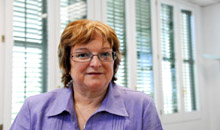Cyborg Feminista , tuétanos de formas & Entrevista a Gill Kirkup en la UOC: Desigualdades de género en las nuevas tecnologías ...

"Un cyborg es un organismo cibernético, un híbrido de máquina y organismo, una criatura de realidad social y también de ficción.
La realidad social son nuestras relaciones sociales vividas, nuestra construcción política más importante, un mundo cambiante de ficción. Los movimientos internacionales feministas han construido la ‘experiencia de las mujeres’ y, asimismo, han destapado o descubierto este objeto colectivo crucial. Tal experiencia es una ficción y un hecho político de gran importancia. La liberación se basa en la construcción de la conciencia, de la comprensión imaginativa de la opresión y, también, de lo posible. El cyborg es materia de ficción y experiencia viva que cambia lo que importa como experiencia de las mujeres a finales de este siglo. Se trata de una lucha a muerte, pero las fronteras entre ciencia ficción y realidad social son una ilusión óptica."
MANIFIESTO CYBORG “Ciencia, Tecnología y Feminismo Socialista Finales del S.XX” (§) ::: Donna Haraway [imagen Gyger]
"Pueden las tecnologías de la información y la comunicación (TIC) convertirse en un nuevo obstáculo para el acceso a la educación para las mujeres de todo el mundo? Esta es la pregunta principal que los expertos que participaron en la mesa redonda sobre "Educación, Género y TIC", celebrado en la UOC el 20 de mayo trató de responder."
 Hoy traemos a este espacio, como ayer, una noticia que tiene su origen en la UOC, concretamente en la UNESCO Chair in e-Learning .... una entrevista a Gill Kirkup bajo el título "Gender inequalities overlay themselves onto new technologies quickly, so we cannot ignore them" . Eso me ha hecho recordar el texto de Donna Haraway que citamos en la cabecera del post ... y como ella dice
Hoy traemos a este espacio, como ayer, una noticia que tiene su origen en la UOC, concretamente en la UNESCO Chair in e-Learning .... una entrevista a Gill Kirkup bajo el título "Gender inequalities overlay themselves onto new technologies quickly, so we cannot ignore them" . Eso me ha hecho recordar el texto de Donna Haraway que citamos en la cabecera del post ... y como ella dice
"El sueño irónico de un lenguaje común para las mujeres en el circuito integrado. (...)
Las páginas que siguen son un esfuerzo blasfematorio destinado a construir un irónico mito político fiel al feminismo, al socialismo y al materialismo. La blasfemia requiere que una se tome las cosas muy en serio y, para mí, es el mejor referente que puedo adoptar desde las seculares tradiciones religiosas y evangélicas de la política norteamericana -incluido el feminismo socialista-. Por eso, este trabajo es mucho más auténtico que si surgiese como mito e identificación. La blasfemia nos protege de la mayoría moral interna y, al mismo tiempo, insiste en la necesidad comunitaria.
Eso me ha recordado dos coplas la primera de la niña de la puebla, con la que tocaba el hermano de mi abuela .... guitarrero el
El otro tema, uno de Pastora Pavón La niña de los peines
... que no pedía formas, sino tuétanos de formas, música con el cuerpo sucinto... para poder mantenerse en el aire (Federico García Lorca)
Pero vamos a lo que vamos, y dejémonos de resonancias ... como decía en la entrevista se habla de "Are information and communication technologies (ICTs) becoming a new barrier to access to education for women around the world? This is the main question that the experts who participated in the roundtable on "Education, Gender and ICTs" held at the  UOC on 20th May tried to answer. Gill Kirkup, a senior lecturer in educational technology at the Institute of Educational Technology at the Open University (UK), chaired the session. She is particularly interested in the ways that gender and technology intersect and has most recently been researching this issue in the context of the use of ICTs for learning and teaching. "
UOC on 20th May tried to answer. Gill Kirkup, a senior lecturer in educational technology at the Institute of Educational Technology at the Open University (UK), chaired the session. She is particularly interested in the ways that gender and technology intersect and has most recently been researching this issue in the context of the use of ICTs for learning and teaching. "
La entrevista comienza así:
Let's begin with an issue raised at the roundtable debate: are ICTs a tool to help women access education or are they becoming a new barrier for them?
Depending on how they are used, they can be either. Distance education has always been attractive to women as a form of study. This is because it has offered flexibility, allowing women to study alongside the other demands of their lives, such as employment and housework. The demands on women often keep them at home, so technologies that help them study from there give them access to learning. Traditional print, mass media, telephone and postal service technologies have been used in distance education very successfully around the world for the last 50 years. When ICTs are introduced in learning, they help with things like reducing the sense of isolation experienced by some women. However, in general, and in all countries where it has been measured, women have less access to ICT equipment and support than men. In addition, they are less confident about using technology, so they tend to use ICTs less than men.
What do you mean they have less access? Can you give an example?
In households where there is only one computer, priority for use is usually given to the husband or father or the children and only secondarily to the mother or wife. The children's use for study is likely to take priority over the mother's. If there is more than one machine in the house, the woman will often inherit the older equipment.
You mentioned confidence as another issue.
Yes. There is about 20 years of research on computer confidence among school children and students. Researchers have consistently found that girls feel less confident using ICTs than boys, even when their skill levels are measured and found to be the same. We did some research in the UK and China some years ago, and we found this to be the case for both Chinese and UK university students, even though each nationality had a different skill set as a result of the different computer skills taught in the school curriculums of each country. Female students had less confidence in their skills than male students from the same country.
 También podéis leer A brief review of the Roundtable on Education, Gender and ICTs en la que participaron Juliet Webster y Gill Kirkup
También podéis leer A brief review of the Roundtable on Education, Gender and ICTs en la que participaron Juliet Webster y Gill Kirkup
The attendees of the Roundtable on Education, Gender and ICTs of UNESCO Chair in e-Learning were professors of Computer Science, and members of the Equality Commission of the UOC and the research group of Gender and ICTs.
Juliet Webster, researcher and consultant on women’s working lives in the Information
Society, led the first roundtable about ICTs in developing countries. She said that in these countries, it is important to make a pedagogical task among women to spread the use of ICTs and, through them, facilitate their access to education. She stated that is even more important to explain and make this pedagogical task to these women’s relatives and their social environment, since this social environment is what usually prevents women from accessing to education, due to social prejudices and other social barriers.
Gill Kirkup, senior professor of educational technology at the Institute of Educational Technology of the Open University (UK), led the second roundtable on Education, Gender and ICTs. During the session, Gill launched some questions and reflected about different issues regarding to this wide working field. As a first reflection, she stated that distance has always been a part of learning, but the factor missing in it, has always been the lack of human support. She said that education embedded in media (radio, tv, and others) predominates over human-to-human communication and interaction. (leer más...)
Fuente: [UOC & UOC UNESCO Chair in e-Learning Weblog ]
- Bitácora de eraser
- Log in or register to post comments


